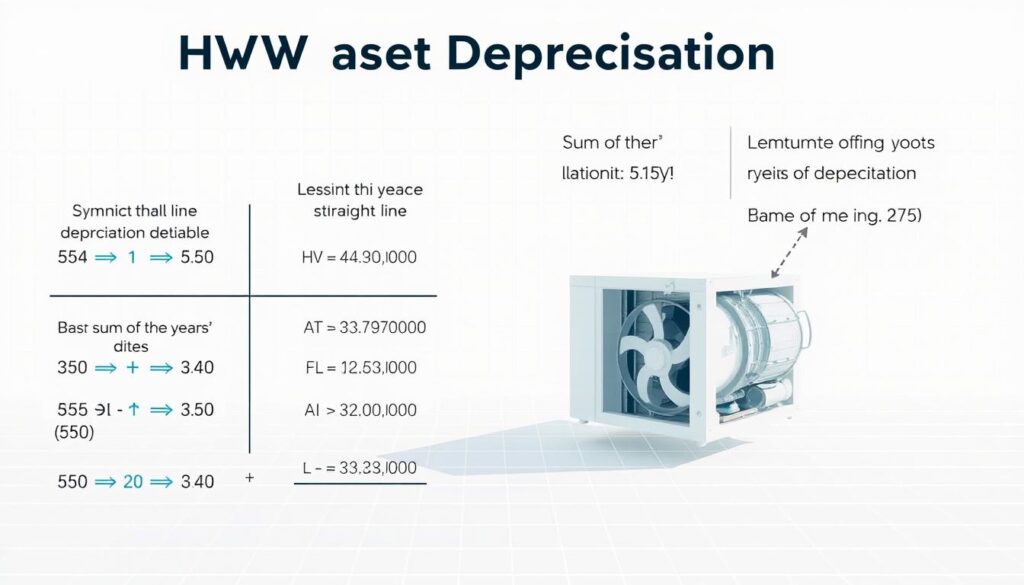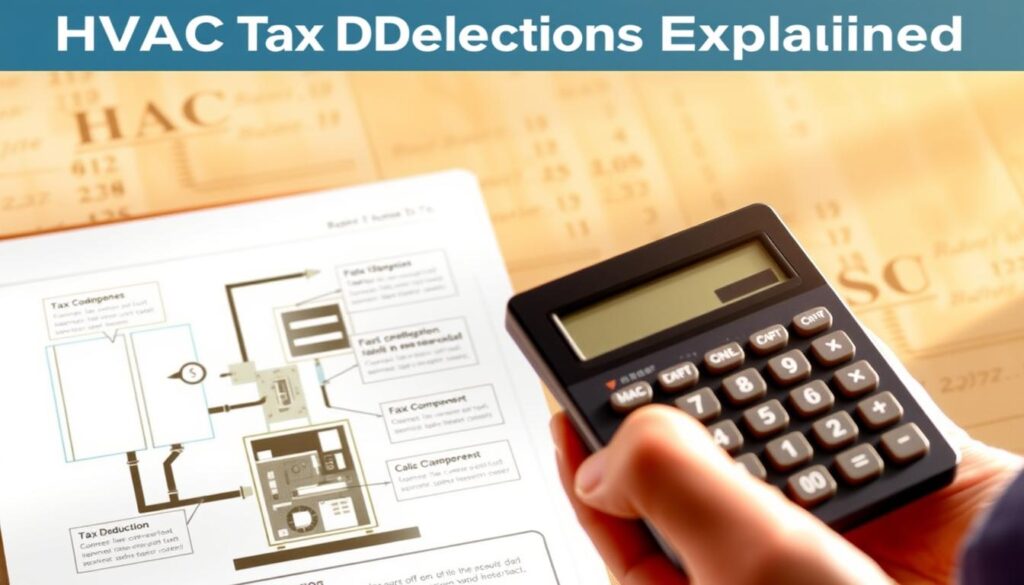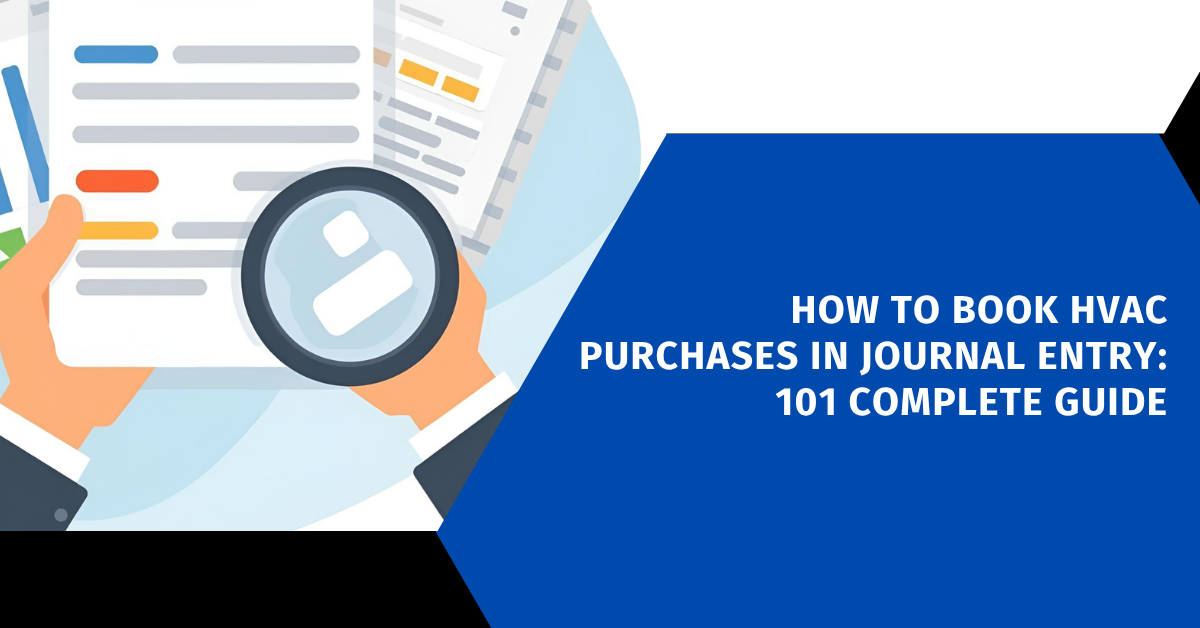Affiliate Disclosure
HVAC Guide Guys is a participant in the Amazon Services LLC Associates Program, an affiliate advertising program designed to provide a means for sites to earn advertising fees by advertising and linking to Amazon.
Are you finding it hard to record HVAC equipment expenses in your financial records? Knowing how to book HVAC purchases in journal entry is crucial. It helps keep your financial statements accurate and boosts your business’s financial health.

Journal entries are the financial core of your business. They track every dollar spent on important things like HVAC systems. Recording these purchases correctly ensures you report taxes accurately, manage assets well, and understand your company’s financial performance.
Whether you run a small business or manage finances, learning to record HVAC expenses is key. It saves time, cuts down on accounting mistakes, and gives a clear view of your investments.
Key Takeaways
- Learn the critical steps for booking HVAC purchases accurately
- Understand the difference between capital assets and operating expenses
- Discover how proper journal entries impact financial reporting
- Identify the essential documentation required for HVAC purchase records
- Gain insights into tax implications of HVAC equipment accounting
Table of Contents
Understanding HVAC Purchases in Accounting
Accounting for HVAC system purchases is important. It affects how you report your finances and plan for taxes. How you document these purchases is key.
When dealing with HVAC assets, it’s crucial to know the difference between expenses and investments. This helps in keeping accurate financial records and making smart financial choices.
Capital Assets vs Operating Expenses
Not every HVAC purchase is treated the same in accounting. It’s important to understand the differences:
- Capital Assets: These are big investments that increase your business’s value over time.
- Operating Expenses: These are regular costs for upkeep and small repairs.
Recognition Criteria for HVAC Systems
To figure out how to record an HVAC purchase, look at these key factors:
- Total cost of the system
- Expected useful life
- Impact on business operations
- Potential for future economic benefits
Cost Components of HVAC Installations
HVAC system purchases have different cost parts that affect accounting:
- Equipment purchase price
- Installation labor
- Modification of existing infrastructure
- Additional materials and accessories
Knowing these details helps you accurately track and report HVAC investments. This ensures you follow accounting standards and get the most tax benefits.
Basic Principles of Journal Entries for HVAC Systems
To understand hvac capital expenditure recording, you need to know double-entry bookkeeping. This method makes sure your financial records are accurate and clear. It’s key for tracking investments in heating and cooling systems.
Double-entry bookkeeping works like a financial GPS. It records where money comes from and where it goes. For HVAC systems, this means tracking every financial move related to your equipment.
- Capture every financial transaction with precision
- Track both incoming and outgoing funds
- Maintain balanced financial records
When you do bookkeeping for heating and cooling systems, you must grasp debits and credits. Each transaction affects two accounts, giving a complete financial view.
“Accurate record-keeping is the backbone of financial management for HVAC investments.”
Here are the main principles for journal entries:
- Record the exact purchase price of HVAC equipment
- Document installation and transportation costs
- Categorize expenses correctly as capital or operational
- Maintain detailed documentation for each transaction
By sticking to these rules, you’ll have a strong system for tracking your HVAC investments. It helps with both short-term accounting and long-term planning.
Explore Our HVAC Shop
Looking for top-rated HVAC tools, parts, and accessories? Visit our shop and find the perfect solution for your needs.
Visit the ShopHow to Book HVAC Purchases in Journal Entry
Keeping track of HVAC equipment purchases is key to good accounting. It helps businesses keep their financial records straight and understand their investments. This guide will show you how to record HVAC purchases in your accounting system.
Step-by-Step Recording Process
Booking HVAC purchases in journal entry needs a clear plan. Here’s how to do it:
- Find out the total cost of the HVAC equipment
- Choose the right account type
- Get ready the journal entry documents
- Use double-entry accounting to record the transaction
Required Documentation
For accurate ledger entries, you need all the right documents. Make sure you have:
- The original purchase invoice
- A delivery receipt
- An installation certificate
- Proof of payment
Account Classification Guidelines
Choosing the right account for HVAC purchases is important. It depends on the equipment’s cost and how long it will last.
| Equipment Type | Account Classification | Typical Treatment |
|---|---|---|
| Small HVAC Units | Operating Expense | Expensed right away |
| Large Commercial Systems | Capital Asset | Capitalized and depreciated |
| Replacement Components | Maintenance Expense | Recorded as repair cost |
Knowing how to book HVAC purchases in journal entry is all about detail and documentation. By following these steps, you’ll keep your financial reports accurate and your equipment investments clear.
Explore Our HVAC Shop
Looking for top-rated HVAC tools, parts, and accessories? Visit our shop and find the perfect solution for your needs.
Visit the ShopCapitalizing HVAC Equipment Purchases
Managing fixed asset accounting for HVAC systems is key for your business. It’s important to understand capital expenditure recording. Capital purchases are big investments that last a long time and add value to your company.
Recording HVAC capital expenditures involves several important steps:
- Identifying purchases that qualify as capital assets
- Determining the financial threshold for capitalization
- Evaluating the potential economic benefits
- Tracking long-term asset value
The IRS says capital assets are purchases over $2,500 that last more than a year. For HVAC, this includes big items like central air units, commercial heaters, or complex ventilation systems.
When deciding to capitalize, consider these key points:
- Total purchase cost
- Expected operational lifespan
- Potential future economic benefits
- Impact on business infrastructure
Properly capitalizing HVAC equipment helps you keep a clear financial record. It shows your company’s asset value and supports long-term planning.
Recording HVAC Maintenance and Repair Expenses
Managing the bookkeeping for heating and cooling systems is crucial. Your HVAC equipment is a big investment. Keeping track of expenses helps with accurate budgeting.
Businesses must understand the different costs of HVAC maintenance and repairs. These costs affect your financial statements and taxes.
Routine Maintenance Entries
Routine maintenance keeps your HVAC system efficient. These costs are usually recorded as operating expenses:
- Filter replacements
- Annual system inspections
- Cleaning and lubrication
- Minor adjustments and tune-ups
Emergency Repair Documentation
Unexpected repairs need quick attention and detailed records. Your repair records should include:
- Date of repair
- Specific equipment details
- Repair description
- Total cost
- Service provider information
Service Contract Accounting
Many businesses choose service contracts for HVAC maintenance. These contracts have prepaid or recurring costs that need careful accounting.
| Expense Type | Accounting Treatment | Typical Cost Range |
|---|---|---|
| Annual Maintenance Contract | Prepaid Expense | $500 – $2,500 |
| Emergency Repair Coverage | Periodic Expense | $300 – $1,000 |
| Comprehensive Service Plan | Amortized Expense | $1,500 – $5,000 |
Pro tip: Always keep detailed receipts and documentation for all HVAC maintenance and repair expenses. This supports your financial records and potential tax deductions.
Explore Our HVAC Shop
Looking for top-rated HVAC tools, parts, and accessories? Visit our shop and find the perfect solution for your needs.
Visit the ShopDepreciation Methods for HVAC Assets

Understanding depreciation is key for your business finances when dealing with HVAC purchases. The IRS says you must spread out the cost of HVAC equipment over its useful life. This means you can’t deduct the whole cost in one year.
There are several important methods for depreciating HVAC purchases. These methods help you track the value of your heating and cooling assets accurately:
- Straight-Line Depreciation: Spreads the asset’s cost evenly over its useful life
- Modified Accelerated Cost Recovery System (MACRS): Speeds up depreciation for quicker tax benefits
- Declining Balance Method: Offers higher depreciation expenses in the early years
Choosing a depreciation method affects your financial reports and tax plans. The IRS often suggests using the MACRS method for commercial equipment.
| Depreciation Method | Annual Expense Pattern | Tax Efficiency |
|---|---|---|
| Straight-Line | Consistent annual amount | Moderate |
| MACRS | Accelerated early years | High |
| Declining Balance | Higher initial expenses | Very High |
For commercial HVAC systems, the IRS usually sets a depreciation period of 39 years. Talking to a tax expert can help you choose the best depreciation strategy for your business.
Double-Entry System for HVAC Transactions
Understanding the double-entry accounting system is key for managing HVAC assets well. It makes sure every transaction is recorded twice, once as a debit and once as a credit. This keeps your financial records for HVAC equipment accurate.
When you make journal entries for HVAC assets, knowing debits and credits is essential. These transactions affect many financial statements. They give a full picture of your HVAC investments.
Debit and Credit Rules
The double-entry accounting system has basic rules for ledger entries for HVAC equipment:
- Debits increase asset and expense accounts
- Credits increase liability, revenue, and equity accounts
- Each transaction must have equal debits and credits
Balance Sheet Impact
Your HVAC purchases change the balance sheet. Buying new equipment leads to:
- An increase in fixed assets
- A decrease in cash or an increase in accounts payable
- Long-term investment representation
Income Statement Effects
HVAC transactions also impact your income statement. They show depreciation expenses and maintenance costs. Recording these properly ensures accurate financial reports. It helps track the real cost of your HVAC assets over time.
Accurate accounting turns HVAC investments into valuable financial insights.
Special Considerations for Commercial HVAC Purchases
Businesses face unique challenges when dealing with commercial HVAC systems. These investments are different from standard purchases. They require careful analysis of financial and operational factors.
Commercial HVAC purchases are big investments, costing between $10,000 to $40,000 per unit. Your accounting must consider several key elements:
- Scale of installation complexity
- Potential energy efficiency upgrades
- Building-specific customization requirements
- Long-term operational impact
Accounting for commercial HVAC needs precise documentation of all costs. This includes equipment expenses, installation, modification, and infrastructure upgrades.
“Proper HVAC capital expenditure recording is not just about tracking costs, but understanding the strategic value of your investment.”
When setting up your commercial HVAC accounting strategy, consider these points:
- Tracking complete installation expenses
- Documenting energy efficiency improvements
- Understanding depreciation schedules
- Identifying potential tax incentives
Your financial team should work with technical experts. This ensures accurate recording of HVAC capital expenditures. It reflects both immediate and long-term financial impacts.
Explore Our HVAC Shop
Looking for top-rated HVAC tools, parts, and accessories? Visit our shop and find the perfect solution for your needs.
Visit the ShopTax Implications and Deductions for HVAC Systems
Understanding taxes for HVAC purchases is key to your business’s financial health. It’s important to know how to depreciate and account for HVAC system purchases. This knowledge helps you use tax benefits wisely.

Investing in HVAC systems can save your business money on taxes. The tax code has several ways to help you save. These strategies can lower your equipment costs.
Section 179 Deductions: Immediate Tax Relief
Section 179 is a great choice for businesses wanting to reduce their HVAC costs. In 2025, you can deduct up to $1.22 million for qualifying purchases. The total purchase limit is $3.05 million.
- Instant tax deduction for eligible HVAC equipment
- Applicable for profitable businesses
- Significant potential for immediate tax savings
Bonus Depreciation Strategies
Bonus depreciation is another strong tax strategy for HVAC. For 2025, you can deduct 60% of the equipment cost. This gives your business more financial flexibility.
Tax Credit Opportunities
Energy-efficient HVAC systems can lead to more tax credits. Carefully documenting your purchases is key. This helps you use these incentives and lower your taxes.
Pro tip: Consult a tax professional to maximize your HVAC-related tax benefits and ensure full compliance with IRS regulations.
By wisely handling depreciation of HVAC purchases, you can turn your investment into a financial advantage for your business.
Common Mistakes in HVAC Purchase Recording
Recording HVAC expenses can be tough for businesses. It needs careful detail to avoid big financial mistakes.
When buying HVAC, several errors can mess up your money records. Knowing these mistakes helps keep your accounting right.
- Expensing Capital Purchases Incorrectly
Many businesses wrongly say big HVAC buys are immediate costs. This mistake changes your financial reports and taxes.
- Neglecting Depreciation Tracking
Not tracking HVAC depreciation right can mess up asset value and tax savings.
- Mishandling Loan and Financing Entries
Not splitting interest and principal payments right can confuse your HVAC costs and debts.
To keep HVAC bookkeeping right, use a strong tracking system. It should clearly show capital buys and regular costs.
| Mistake | Potential Impact | Recommended Solution |
|---|---|---|
| Incorrect Expense Classification | Misrepresented Financial Statements | Use Proper Capitalization Methods |
| Depreciation Tracking Errors | Inaccurate Asset Valuation | Implement Consistent Depreciation Schedule |
| Loan Payment Misrecording | Financial Record Discrepancies | Separate Interest from Principal |
Using professional accounting software and regular checks can prevent these mistakes. Talking to a financial expert can also offer specific advice for your business.
Explore Our HVAC Shop
Looking for top-rated HVAC tools, parts, and accessories? Visit our shop and find the perfect solution for your needs.
Visit the ShopBest Practices for HVAC Asset Management
Managing HVAC assets needs smart financial planning and detailed accounting. Fixed asset accounting for HVAC systems is key. It turns big investments into lasting financial gains.
“Smart asset management turns expensive equipment into strategic business resources.”
Your accounting for commercial HVAC must focus on a few key areas:
- Keep a detailed asset register with all equipment info
- Use strong tracking for maintenance and repair costs
- Make sure to regularly check HVAC financial accounts
- Set up clear depreciation tracking methods
Good HVAC asset management is more than just keeping records. You should use special asset management software. It should work well with your main accounting system.
| Asset Management Practice | Key Benefits |
|---|---|
| Periodic Asset Valuation | Accurate financial reporting |
| Warranty Tracking | Cost reduction and risk mitigation |
| Maintenance Schedule Documentation | Prolonged equipment lifecycle |
By following these best practices, you’ll make your HVAC assets valuable. They will help your business grow financially over time.
Conclusion
Figuring out how to book HVAC purchases in journal entries is complex. It needs careful planning and attention to detail. Small business owners in home services must have strong accounting practices. These practices help track finances well and support growth.
Accounting for HVAC system purchases is more than just keeping records. It involves using detailed documentation and knowing important classification rules. This way, you can improve your financial management. Accurate records help you see your equipment investments, how to depreciate them, and tax benefits.
Good HVAC asset management is key to your business’s financial health. Accounting rules and technologies are always changing. It’s important to keep up with the latest practices. Learning about journal entry rules helps you make better financial choices and stay ahead in the home services market.
At Out of the Box Technology, we help entrepreneurs like you with financial processes. Our knowledge can help you handle complex accounting issues. This lets you focus on providing great HVAC services and keeping your finances in order.

